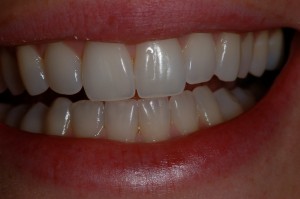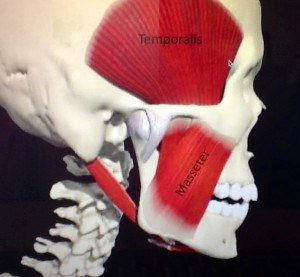This Week in Dentegrity
Monday, May 27, 2014
Have you noticed your teeth are either biting pressure sensitive or cold sensitive? Have you been told that you have a cracked tooth and require a crown? Have you noticed that your teeth feel loose or are your gums bleeding more than usual? Are you getting headaches more frequently? Do you have any porcelain crowns that hurt? Have you noticed you are biting down and feeling more contact on your front teeth than your back teeth? If so, the good news is: Your new symptoms may be related to what we call occlusion.
Equillibration
Occlusion is the way your teeth meet properly. Malocclusion is an improper bite. The reshaping of the biting surface of natural teeth or porcelain crowns is called an Equillibration. The reshaping mentioned for biting strait down is called establishing proper “centric relation” and the proper reshaping for side to side, or chewing motion is called correction of “lateral interference.” Skillful equillibration of teeth is similar to both fine tuning an engine or balancing and rotating ones tires – the advantage being your teeth when equillibrated or fine tuned as needed can spare you unnecessary and often expensive dental work like balancing your tires on your car can prolong your tire life and likely avoid a “blow out.” All equillibration is preformed painlessly without the need for anesthetic. Also malocclusion contributes to recession of your gums and must be remedied prior to any corrective periodontal measures, ie “grafting, or “PST.”
Malocclusion
 All of the symptoms mentioned above can be related to a malocclusion. All porcelain crowns wear down more slowly than natural teeth and eventually all porcelain crowns require an equillibration. All teeth have a pressure sensitive ligament called the “PDL.” The PDL reflexively opens your mouth and instantly hurts when a tooth is acutely traumatized. For example: unexpectedly biting down on a cherry pit or popcorn kernel. It hurts, we don’t think about it and we automatically open our mouth – the “Yin” of the PDL. Conversely as a porcelain crown ages it will begin to hit prematurely and cause the “Yang” of the PDL to attempt to correct this malocclusion. In other words, we will grind our teeth at night subconsciously in an attempt by the PDL to fix our bite. During this process our teeth can become loose or painful as our muscles of biting “mastication” become abnormally enlarged, powerful, inflamed and/or “hypertonic.” These muscles can be tender to touch or palpation, and “trigger point” referred headache pain can result. All of the above can be simply corrected by equillibration once appropriately evaluated. The protocol to equillibrate more than one tooth predictably may require an analysis of your bite prior to equilibration, facilitated by study models, and/or a nightguard or splint. The goal of splint therapy is both to improve the biting surface of maloccluded teeth, eliminate lateral interference, thereby allowing sore and enlarged chewing muscles to relax and begin the process of healing of TMJ dysfunction.
All of the symptoms mentioned above can be related to a malocclusion. All porcelain crowns wear down more slowly than natural teeth and eventually all porcelain crowns require an equillibration. All teeth have a pressure sensitive ligament called the “PDL.” The PDL reflexively opens your mouth and instantly hurts when a tooth is acutely traumatized. For example: unexpectedly biting down on a cherry pit or popcorn kernel. It hurts, we don’t think about it and we automatically open our mouth – the “Yin” of the PDL. Conversely as a porcelain crown ages it will begin to hit prematurely and cause the “Yang” of the PDL to attempt to correct this malocclusion. In other words, we will grind our teeth at night subconsciously in an attempt by the PDL to fix our bite. During this process our teeth can become loose or painful as our muscles of biting “mastication” become abnormally enlarged, powerful, inflamed and/or “hypertonic.” These muscles can be tender to touch or palpation, and “trigger point” referred headache pain can result. All of the above can be simply corrected by equillibration once appropriately evaluated. The protocol to equillibrate more than one tooth predictably may require an analysis of your bite prior to equilibration, facilitated by study models, and/or a nightguard or splint. The goal of splint therapy is both to improve the biting surface of maloccluded teeth, eliminate lateral interference, thereby allowing sore and enlarged chewing muscles to relax and begin the process of healing of TMJ dysfunction.
Bruxism, Nightguards and Botox
 The good news for people grinding their teeth (bruxism), day or night that have likely headache pain and muscle tenderness, or painful teeth is that as of 2011 the FDA has approved therapeutic injection of Botox for migraine related issues previously mentioned. Botox is an extremely safe and amazingly effective medication to achieve normal muscular activity by relaxing and weakening hyperactive nighttime grinding muscles – one of the major goals of nightguard treatment. This is really exciting news for people who cannot tolerate wearing a nightguard. The deprogramming of abnormal muscular activity typically requires three to six months of wearing a nightguard or can be simply achieved in two weeks after receiving therapeutic injection of Botox. Botox relaxes the muscles affected and can allow for proper equillibration, minimize or negate the time typically spent wearing or “not wearing” a night guard. Dr. Glassman, a member of the American Academy of Facial Esthetics has been extensively trained and is licensed and certified to preform these therapeutic injections. Dr. Glassman has seen amazing results with both nightguard “splint” therapy, therapeutic injections and/or equillibration often completely eliminating the causes of bruxism, migraine, tension headache, and painful teeth.
The good news for people grinding their teeth (bruxism), day or night that have likely headache pain and muscle tenderness, or painful teeth is that as of 2011 the FDA has approved therapeutic injection of Botox for migraine related issues previously mentioned. Botox is an extremely safe and amazingly effective medication to achieve normal muscular activity by relaxing and weakening hyperactive nighttime grinding muscles – one of the major goals of nightguard treatment. This is really exciting news for people who cannot tolerate wearing a nightguard. The deprogramming of abnormal muscular activity typically requires three to six months of wearing a nightguard or can be simply achieved in two weeks after receiving therapeutic injection of Botox. Botox relaxes the muscles affected and can allow for proper equillibration, minimize or negate the time typically spent wearing or “not wearing” a night guard. Dr. Glassman, a member of the American Academy of Facial Esthetics has been extensively trained and is licensed and certified to preform these therapeutic injections. Dr. Glassman has seen amazing results with both nightguard “splint” therapy, therapeutic injections and/or equillibration often completely eliminating the causes of bruxism, migraine, tension headache, and painful teeth.
Real patients, real results:
Below are a few examples of real patient’s results:
“I fly from San Francisco to have Dr Glassman take care of my teeth. I arrived in his office several years ago with many problems, caused by old amalgam fillings that had deteriorated. Other dentists had failed to detect the dangers and had simply sent me for root canals and crowns. Not Dr Glassman. He want to save living teeth! He saw right away that 2 additional teeth had fillings that looked suspicious. He removed the defective fillings, replacing them with his trademark: highly technically crafted gold onlays. Because gold is softer than the old amalgam, upper and lower teeth adjust to each other more easily, which avoids cracking. Because of my years with Dr Glassman, my teeth work so much better together. He is a meticulous craftsman, but even more, a real artist whose deep knowledge of dental fundamentals makes him able to devise solutions for problem teeth. The results are truly amazing,”
Lenore H.
“He is the best dentist I ever had in my life. I have seen him for over two years now. I had some treatment done at the other dentists while ago and I needed some more work done, because the other dentist’s treatment was not complete. I asked around my friends about their dentists and one of my close friend recommended Dr. Glassman. He did extraction of two teeth, then implanted titanium posts and crowns. I never had been looking forward to going to the dentist before, but Dr. Glassman is an exception. Dr. Glassman really cares about the patient like a member of his family. He explained every detail and answer all my questions I had and he was making sure if I was comfortable with everything he was doing. And being in his chair was really comfortable. He gives all patient his cell phone number and email address just in case for the emergency situation. He works with many famous actors. He is a passionate artist and an amazing doctor. I highly recommend him.”
Kazuhiro T.
Equillibration and Occlusal Adjustment in the news:
The U.S. Food and Drug Administration today approved Botox injection (onabotulinumtoxinA) to prevent headaches in adult patients with chronic migraine. Chronic migraine is defined as having a history of migraine and experiencing a headache on most days of the month.
“Chronic migraine is one of the most disabling forms of headache,” said Russell Katz, M.D., director of the Division of Neurology Products in the FDA’s Center for Drug Evaluation and Research. “Patients with chronic migraine experience a headache more than 14 days of the month. This condition can greatly affect family, work, and social life, so it is important to have a variety of effective treatment options available.”
http://www.fda.gov/NewsEvents/Newsroom/PressAnnouncements/ucm229782.htm
“According to the National Institutes of Health brochure on TMJ Disorders irreversible treatments that have not been proven to be effective — and may make the problem worse include:
- orthodontics to change the bite.
- crown and bridge work to balance the bite.
- grinding down teeth to bring the bite into balance (occlusal adjustment).
- mandibular repositioning splints (MORA) which permanently alter the jaw position and bite.”
http://tmj.org/site/content/occlusal-bite-adjustment
“Some of the dead “give-aways” to needing occlusal adjustment is if you wake up in the morning with sore jaws or if you feel like your jaw is lopsided when you bite. If this sounds familiar to you, then you may need an adjustment.”
http://www.bethesdamddentist.com/our-services/specialties/periodontic/occlusal-adjustment/
Hygienists can help pinpoint problems with occlusion.
http://www.rdhmag.com/articles/print/volume-34/issue-5/features/the-power-of-occulsal-observation.html
If you are interested in information about Equillibration and Occlusal Adjustment, No-Prep Porcelain Veneers, Chao Pinhole Surgical Technique or Concierge Services please contact Dr. Glassman’s office.
The articles listed above are for informational purposes only. Please talk to your dental provider before deciding what options are right for you.
Feel free to contact Dr. Glassman’s office at (818) 575-8042 with any questions or for further information.

